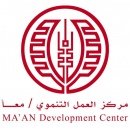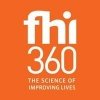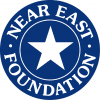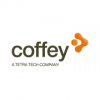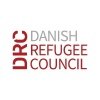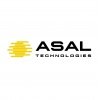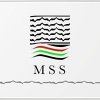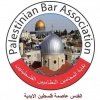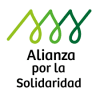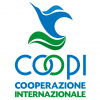Ecological agriculture curricula development
Terms of reference (ToR) for ecological agriculture curricula development
MA’AN Development Center
MA’AN Development Center is an independent Palestinian development and training institution established in January 1989 and registered as a non-profit organization. The main office is located in Ramallah with branch offices in Gaza, and Jenin. MA’AN's work is informed by the necessity of creating independent, self-reliant initiatives that lead to the development of human resources for sustainable development, which incorporate values of self-sufficiency and self-empowerment.
Project profile
Project name Building Capacity to Enhance Sustainability in Ecological Agriculture in the West Bank
Locations West Bank
Targeted beneficiaries
University and TVET agriculture students, and agriculture extension workers
Project background
Agriculture plays an essential role in the Palestinian economy and in the achievement of national food security. Yet, the rapidly growing Palestinian population places enormous stress on local food production and local natural resources. Over the past 50 years, no sector of Palestinian society has been put under greater stress than the farming sector. Land confiscation, Israeli settlement building, water access restrictions, movement restrictions, the construction of the Wall, and restrictions on import and export of goods have all combined to create an extremely difficult situation for Palestinian farmers. Access to inputs such as safe fertilizers and pesticides is restricted, whilst at the same time it is very difficult for farmers to access international markets for the export of goods. Domestically, Palestinian farmers also find it difficult to compete with subsidized Israeli agriculture and the resultant cheap Israeli produce that floods the Palestinian market. High input industrialized farming is one strategy that Palestinian farmers have tried to increase productivity and competitiveness, using copious amounts of expensive and unsafe chemical fertilizers and pesticides as well as poly-tunnels and plastic ‘mulch.’These practices, however, have led to a myriad of health and environmental risks and pollutants which undermine the sustainability of Palestinian lands, produce, and farmers’ and consumers’ livelihoods.
Expanding on and developing from the previous implementations, this project integrates the progress and successes of its predecessor to further institutionalize and build ecological agriculture education and awareness raising in the West Bank. While the previous project focused on training school students, women and university students, we found more interest than expected from the university students, where we had to modify the training schedule to include all the interested students. This project looks towards expanding and increasing the ecological agricultural market in the West Bank in a multipronged approach of expanding the pool of ecological agricultural experts, while targeting farmers through targeted on-site trainings, and the wider public through an awareness campaign to change attitudes towards ecological agricultural practices.
The beneficiaries will be chosen based on previous projects and relations with Kadoorie and AlNajah Universities, alongside their close proximity to Beit Qad where trainings will be conducted. The direct beneficiaries will be university students, extension workers and farmers who will be attending trainings and be taking the courses offered by MA’AN Beit Qad agriculture station.
Scope of work
The contractor is expected to deliver a syllabus that contains the following components:
- Training material,
- Trainer’s guide,
- Trainee’s guide.
Detailed SoW for the curricula development
- Prior to commencement of curricula development, a quick assessment of the available courses at Kadoorie and Al-Najah universities need to be conducted by the contractor. The contractor is then expected to identify gaps of knowledge and skills in ecological agricultural theoretical and practical education,
- Prior to commencement of curricula development, the contractor needs to conduct a quick mapping of existing material that can be adapted to be part of the to be developed curricula,
- The contractor is expected to adapt (and develop when needed) curricula for ecological agriculture education and training targeting 1) universities and TVET centers students, 2) extension workers, 3) recent graduates of university and TVET students,
- Developed curricula need to be adapted to each target group; each target group will receive a specialized syllabus in accordance to their technical knowledge and needs,
- The developed curricula should be practice-based, and use real-life cases, examples, and experiences,
- Potential topics could include: Organic Pest Control, application of Liquid Manure, Ecological Farming, Aquaponics, Soil Management & Enrichment, Worm farms, Bee Keeping, Raised Beds System, Vertical Farming, Intercropping, Sustainable Water Management, IPM with non-chemical applications, and others,
- The developed curricula need to be in the Arabic language. MA’AN is expecting a strong technical Arabic language, and not just a translation with no attention to the technical language used,
- The contractor is expected to develop a trainer’s manual that contains teaching methodologies, case studies, group activities, exercises, activities, energizers, ice-breakers, field activities. The trainer’s manual should be the ultimate guide for all educators and trainers on how to deliver the curricula and how to adapt to their respect educational and institutional settings,
- The contractor is expected to develop a trainee’s manual. The manual should guide the students throughout the training/education process and provide them with all the resources needed to fulfil their training needs,
- The curricula need to include fully designed skill and knowledge measurement and evaluation tools to be used by the trainers,
- Curriculum needs to use real life cases facing farmers in field, challenges, and opportunities related to ecological farming,
- For exercises to be used in the curricula or in the trainer’s manual, the contractor needs to incorporate real life examples of role models from the local Palestinian context,
- The curricula need to be adapted for green entrepreneurship,
- The curricula should include all needed visual and graphical aids, and it’s the contractor’s responsibility to design and integrate these aids and graphics,
- The contractor is expected to develop the power point presentations to be used to be trainers and educators.
Contractor’s qualifications
The contractor should possess, and is able to demonstrate progressive prior work experience in the following areas:
- Curricula development in the areas of agriculture, ecological agriculture, organic agriculture, or any related topic,
- Development of teacher/trainer training manuals that include teaching aids, teaching/training methodologies, exercises, and evaluation tools,
- Deep knowledge in agriculture value chains development,
- Experience in developing and delivering of adult training,
- Past experience in technical writing.
The implementing team should be able to demonstrate graduate education and technical expertise in the following areas:
- Entrepreneurship,
- Adult training,
- Youth development,
- Business development,
- Agriculture development,
- Ecological agriculture,
- Value chain analysis and development, with focus on Palestinian agriculture in Gaza Strip and West Bank.
Deliverables and work schedule
- Work plan for the implementation of the assignment for MA’AN’s approval before commencement. To be delivered no later than three days after the kick-off meeting,
- Outlines of the curricula and training manuals to be developed and approved prior to commencement,
- Print-ready softcopies of the developed curricula, and training manuals, in “pdf” format,
- Softcopies of the developed curricula, and training manuals, in “docx” format.
Implementation timeframe
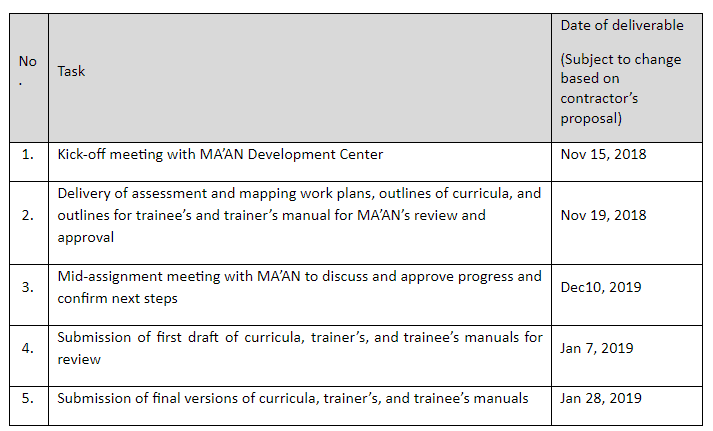
Selection criteria
Offers will be first assessed on their technical merits using the evaluation criteria below. Only offers with technical scores of at least 70 points will qualify for the financial review. The financial offer weight is 40% from the total weight of the evaluation while the technical offer is 60%.

Application requirements
Applications MUST include:
- Technical offer:
- The contractor’s legal name and official registration documents,
- The contractor’s technical work history in accordance with the requested areas of expertise,
- The implementing team members, their appointed roles and responsibilities, and their resumes (with references) illustrating the related experiences in response to the requested qualifications,
- Implementation work plan,
- Full names, positions, and dates of birth for the contractor’s key staff and if applicable, for any subcontract related to this assignment,
- Two previous examples of similar work.

- Financial offer: Should be submitted in $USD using the BoQ form in annex 1.
Proposals should be submitted to the following address in a two separate sealed and stamped envelopes; one for the technical offer and the other for the financial offer.
Deadline for submission is 16:00, November 8, 2018 in closed and stamped envelope.
Special terms
- The contractor should get MA’AN Development Center approval on all work plans, methodologies, and any other tool prior to commencement,
- The contractorshall not subcontract in whole or in part any of this assignment’s tasks without the explicit, written approval of MA’AN Development Center,
- The contractorshall provide MA’AN Development Center with full names, positions, and dates of birth for its key staff and if applicable, for any subcontract related to this assignment,
- The contractorshall handle all logistics in terms of transportation, communication, coordination, and permits to West Bank and Gaza if needed,
- The contractorshould be able to provide official VAT invoices,
- The project is VAT exempted, financial offers must be in USD, excluding VAT, and adhere to VAT exemption procedures applied by Ministry of Finance in the West Bank.
- The contractorshould be able to provide deduction at source.
Payment schedule
Payment will be made according to the following schedule, subject to certification of satisfactory completion by MA’AN technical team:

ANNEX 1: Financial offer

- All costs above must be in $USD.




